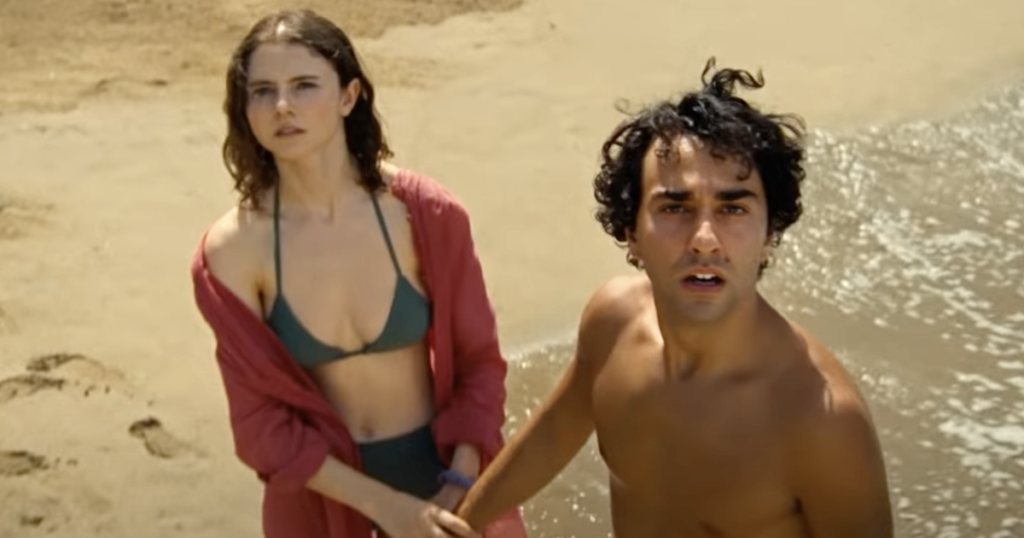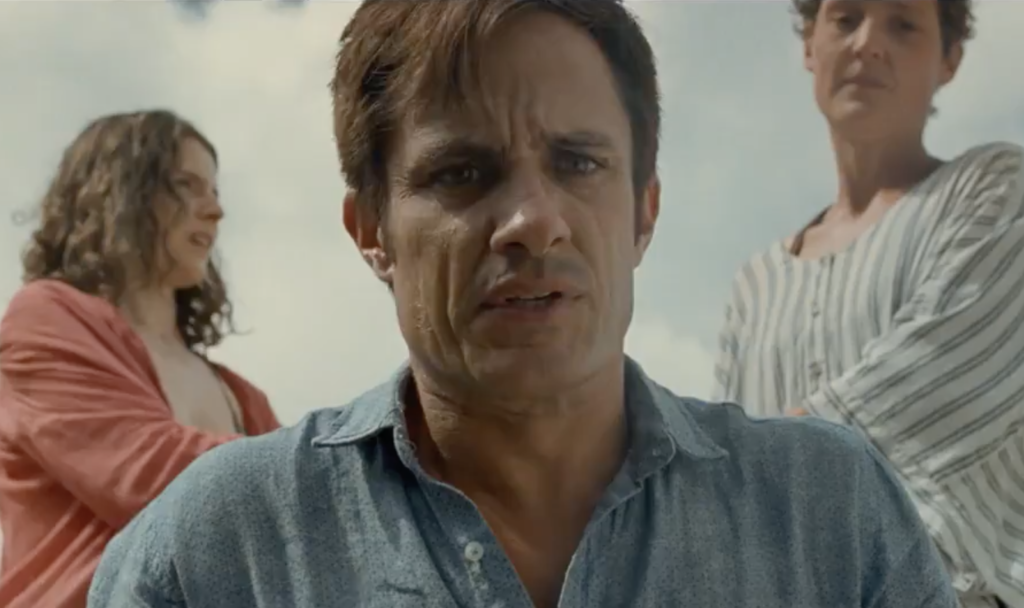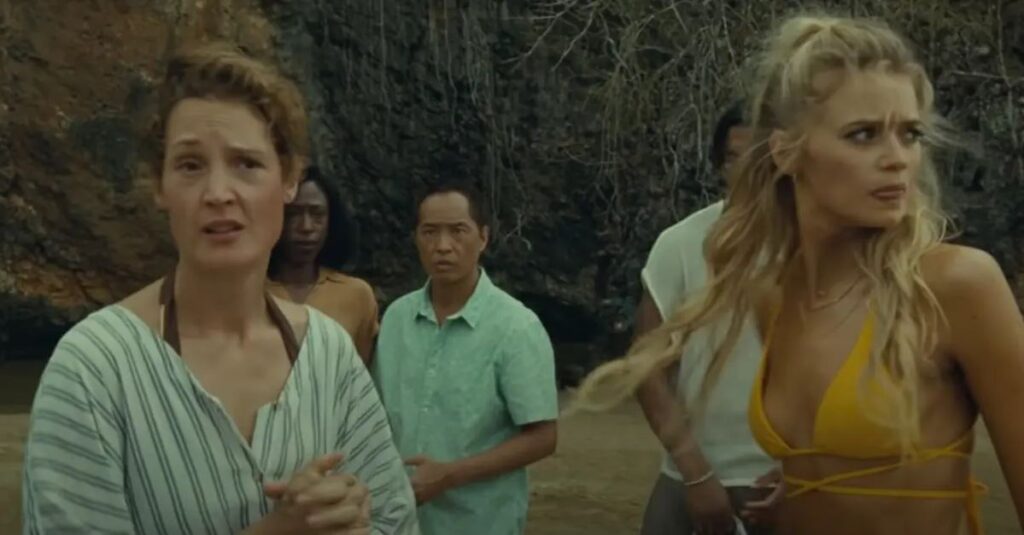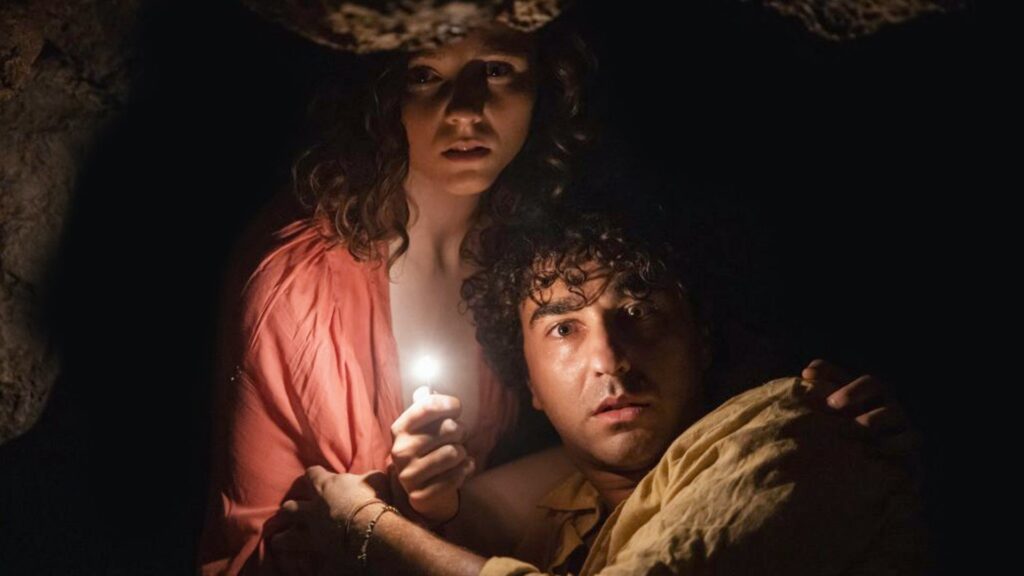
The great twist of M. Night Shyamalan’s career is that his movies aren’t really about twists. Sure, a number of his films indulge in third-act rug-pulls that invariably induce gasps, hoots, or groans. But the thing about endings is that, while they tend to stick in our brains, they rarely make or break a picture. The Sixth Sense features one of the most memorable reveals of all time, but it wouldn’t be nearly as meaningful (or as memorable, for that matter) if it weren’t preceded by a delicate story that unfolds with such elegance and detail. And even if you scoffed at the conclusion of The Village, your momentary derision shouldn’t invalidate its haunting, excruciatingly suspenseful depiction of a frightened young woman attempting to navigate the world. So when I tell you that the ending of Old, Shyamalan’s latest feature-length puzzle box, doesn’t really matter, I’m not implying that it doesn’t carry any element of surprise; I’m simply expressing a judgment that this movie’s soft, not-entirely-unpredictable destination is less important than its silky, enveloping journey.
I’d still encourage you to go into Old as cold as possible, not only as a matter of principle but also because its very premise essentially constitutes a spoiler. Even here, though, foreknowledge can’t tarnish the pleasure in how Shyamalan gradually unveils his brain-teasing conceit. To wit: Roughly half an hour into the film, two vacationing children—six-year-old Trent (Nolan River) and 11-year-old Maddox (Alexa Swinton)—find themselves conversing pleasantly with fellow travelers, a married couple named Patricia (Nikki Amuka-Bird) and Jarin (Ken Leung). The camera, operated by the invaluable Mike Gioulakis, is fixed solely on the adults, with the kids sitting behind the frame. The mood is cheerful, but as Jarin plays the friendly game of guessing the youths’ ages (“I’m pretty good at this”), an invisible tension begins to grip the screen, an unspoken frisson of strangeness. Jarin turns his eyes to Maddox, still off screen, and appraises her figure: “I’d say you’re about 15,” he estimates, as Trevor Gureckis’ score starts to quietly throb. We hear giggles from the still-unseen youngsters, who promptly inform Jarin that they are, in fact, 6 and 11. As Jarin’s expression slips from amusement to bafflement, the camera finally (finally!) rotates back toward Maddox and Trent, and we see that they’re now a good five years older than they’d been a few minutes ago, and are being played by entirely different actors.
What the hell? But also, holy hell! Forget, for a moment, the logistical and emotional ramifications of this development, and consider instead the sheer style that Shyamalan flaunts in delivering it—the poise, the precision, the patience. Like any cinephile with access to the internet, I learned (inadvertently) about the basic setup for Old well before I entered the theater, yet I still found this sequence gripping for its cheeky flair, a sly construction that’s both forceful and playful. If Old’s plot centers on, well, “the beach that makes you old,” its presentation suggests the work of a director who remains very much in his prime.

This is not to suggest the film is a masterwork. Like most of Shyamalan’s pictures, it suffers from a certain stiffness, an artificiality that infects both its dialogue and its characters. Its ending, while hardly a cheat, indulges in a sentimental streak that betrays its prior intensity and ruthlessness. And while its deathly serious tone is understandable—the wackadoo premise is cause for panic, not levity—it misses some opportunities for black humor; here’s a movie where a 22-year-old actor gets to pretend that he’s six, and it’s somehow devoid of physical comedy. Old probably could have been smarter and funnier, if only it had been penned by a smarter and funnier writer.
But then it wouldn’t be an M. Night Shyamalan film. The auteur may have his flaws—he can be obvious, pompous, and clumsy—but he also has a knack for turning those flaws into strengths. Old’s mannered dialogue, for example, tends not to resemble how people actually talk to each other—this is especially true when it comes to characters introducing themselves and identifying their occupations—but its awkward rhythm amplifies the sensation that something isn’t quite right in the ostensible paradise where the movie takes place. His shameless showmanship, on the other hand, is exactly right for this material; in chronicling the film’s grisly events with such lurid panache, he lends the goofy concept a kind of dignity, exhibiting respect for his audience as well as his own craft.
About that paradise: The setup of Old is gracefully streamlined, introducing its characters and its gorgeous setting with clarity and economy. (Shooting took place in the Dominican Republic, because even an artist as gifted as Shyamalan can’t turn Philadelphia into a coastal haven.) Trent and Maddox’s parents, Guy (Gael García Bernal) and Prisca (Phantom Thread’s Vicky Krieps), have whisked their kids to a resort for one last blissful vacation before their impending divorce. The welcoming hotelier directs them to a beautiful and secluded beach, where they’re joined by another couple, the somewhat prickly Charles (Rufus Sewell) and Chrystal (Lovecraft Country’s Abbey Lee), who are also toting their young daughter, Kara (Mikaya Fisher), and Charles’ mother, Agnes (Kathleen Chalfant). Also present are the aforementioned Jarin and Patricia, along with a rapper known as Mid-Sized Sedan (Aaron Pierre, from The Underground Railroad) who’s first glimpsed at dusk, blood trickling ominously from his nose.

It’s a sizable cast, and Old moves so quickly that it doesn’t afford its characters much room to breathe; the only adult who really makes an impression is Charles, and that’s because he’s a gigantic jerk. But the film’s hook is so tantalizing, and its momentum so barreling, that its thinness weirdly becomes an asset, exploring how various archetypes—the snob, the waif, the artist, the intellectual—might respond when faced with such a bewildering predicament. (The script throws in a few lines about dead cells and fingernail growth, presumably designed to fend off potential nitpickers; if you’re still inclined to search for holes in the plot, I’m sure you can find plenty, and I also pity your priorities.) And once the toddlers turn into teenagers—the elder Trent and Maddox are played by Alex Wolff and Thomasin McKenzie, respectively, while Kara ages into Eliza Scanlen (extending to four features an unblemished streak of portraying characters who [redacted])—Shyamalan starts to let loose, and Old itself transforms from metaphysical mystery into remorseless set-piece machine.
At its best—which constitutes a healthy chunk of its running time—Old finds Shyamalan fusing his technical skills with his fearsome imagination. That “Next Spielberg” cover may dog him forever, but he shares with the master a nigh-fanatical care for composition, along with a gusto that prevents his images from looking fussy or overworked. Even relatively banal scenes possess an undercurrent of spooky unease; when Guy and Prisca bicker in their hotel room, the camera glides on a dolly from one entryway to another, locating the pair on different planes and accentuating their figurative distance. And at the beach, Shyamalan really struts his stuff: fluid tracking shots, wide arrangements, extreme close-ups that fill half of the frame with an actor’s blotchy face with the sky glowing behind them. It’s only fitting that Shyamalan sneaks Gioulakis’ name onto a plaque in a throwaway shot; between their prior collaborations (Split, Glass) and his work on other high-sheen horror pictures (It Follows, Us), Gioulakis has fast become one of the most talented cinematographers currently working.

Thematically, it’s possible to read Old as a treatise on mortality, but that both overstates its ambition and undersells its execution. It’s really just a fun genre exercise, one where Shyamalan challenges himself to (har har) twist his premise in clever and unexpected ways. He passes the test comfortably; the movie is replete with scenes of electric tension and ghoulish innovation. An open wound turns into a scar in a matter of seconds. An impromptu surgery grapples with magically healing skin, along with a tumor that suddenly swells from the size of a golf ball to a cantaloupe. Some innocent fumbling leads to new life—and death. And in the film’s grandest sequence, Shyamalan smoothly crosscuts between two terrifying encounters; in one, brittle bones reshape themselves with sickening crunches, while in the other, a piece of rusted metal becomes a syringe filled with poison.
This is all extremely cool, even if it isn’t particularly substantial. To the extent Old supplies any pathos, it comes from the fraternal closeness between Maddox and Trent, a relationship that feels not only hopelessly confused but also genuinely sweet. The burgeoning stars who play them as teenagers are especially effective. Both have submitted superior performances elsewhere—McKenzie knocked me flat in both Leave No Trace and Jojo Rabbit, while Wolff was excellent just last week opposite Nicolas Cage in Pig—but here they manage to muscle past their director’s clunkier tendencies, and to lend their characters a degree of emotional realism. Actors, man. They grow up so fast.
Grade: B
Jeremy Beck is the editor-in-chief of MovieManifesto. He watches more movies and television than he probably should.
